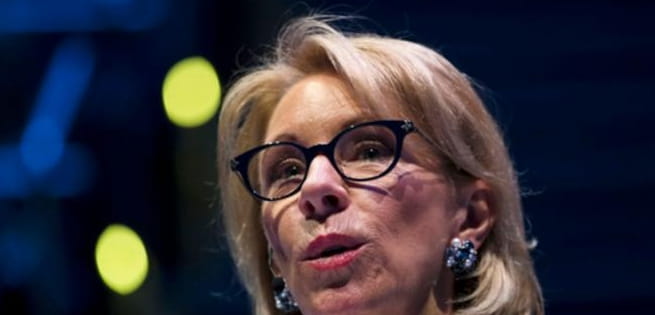DeVos takes step in the right direction

Education Secretary Betsy DeVos has released proposed guidelines on campus sex assault and harassment cases. Credit: AP / Matt Rourke
When Secretary of Education Betsy DeVos announced her plan to revise federal guidelines on campus sexual assault last year, partly out of concern for fairness to the accused, victim advocates and many Democrats were in an uproar. Now the proposed new rules have been unveiled, to a new firestorm. Sen. Kirsten Gillibrand (D-N.Y.) charged on Twitter that DeVos was “betraying survivors of sexual assault and harassment on college campuses.”
But much of the reaction is a false alarm. In fact, the revision of campus sexual assault guidelines is arguably one of the few praiseworthy steps with which the Trump administration can be credited so far.
Sometimes, the alarm has been literally false. The Twitter account of NARAL Pro-Choice America shared a story on the DeVos proposals with the comment that the new rules “would require universities to allow accused sexual abusers to cross-examine and re-traumatize their victims.” Rep. Joe Kennedy (D-Mass.) retweeted this claim with the comment, “No survivor should be cross-examined by his or her accused rapist,” to 32,000 retweets and 95,000 likes.
Yet the article tweeted by NARAL explicitly said cross-examination would not be carried out by the accused but by advisers or attorneys; accuser and accused can even be in different rooms. When this was pointed out to Kennedy by the Department of Education press secretary, he did not acknowledge error but responded with another dubious statement: that 1 in 4 female undergraduates are sexually assaulted. (The figure comes from studies that conflate rape with intoxicated sex and count an unwanted kiss as sexual assault.)
The shift in favor of cross-examination, discouraged under post-2011 federal guidelines, is one positive aspect of the DeVos rules. Another is the change in standards for sexual harassment claims, which would have to allege not merely “unwelcome” conduct but conduct sufficiently severe, pervasive and “objectively offensive” to impede equal access to education.
Obama-era rules required Title IX sexual assault complaints to be adjudicated under the lowest standard of proof — preponderance of the evidence, which means finding against the accused if it was deemed even slightly more probable than not that misconduct occurred. Before 2011, many schools had used a higher “clear and convincing evidence” standard. The new guidelines allow both; but schools must use equal standards for accused students and faculty/staff, and for sexual misconduct and other infractions carrying similar penalties. This seems eminently fair.
Parts of the new rules do not seem well thought through. The language of the draft guidelines is vague as to when Title IX will cover off-campus misconduct between students and whether institutions will be held liable for misconduct by professors when the administration did not know about it. These problems can be corrected when the rules are opened for public comment. But advocacy groups want to torpedo the new rules, not improve them.
Detractors claim the only opposition to the Obama-era guidelines comes from fringe men’s rights groups. They ignore the fact that numerous law professors, including renowned feminist legal scholars such as Harvard’s Janet Halley and Jeannie Suk Gersen, have criticized the post-2011 rules for being stacked against the accused — and that more than 100 accused young men have won claims of wrongful punishment in federal courts.
Perhaps the most shocking response to the Title IX proposal came from the American Civil Liberties Union, which tweeted a complaint about “inappropriately favoring the accused.” It’s a strange time when the Trump administration takes a stand for due process — the denial of which often hurts minority men most — while a venerable civil liberties group makes an exception for men accused of sexual misconduct.
Cathy Young is a contributing editor to Reason.
